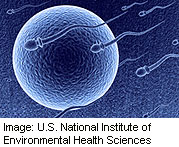- 7 Best Breads for Maintaining Stable Blood Sugar
- Gelatin vs. Collagen: Which is Best for Skin, Nails, and Joints?
- The Long-Term Effects of Daily Turmeric Supplements on Liver Health
- Could Your Grocery Store Meat Be Causing Recurring UTIs?
- Are You Making This Expensive Thermostat Error This Winter?
- Recognizing the Signs of Hypothyroidism
- 10 Strategies to Overcome Insomnia
- Could Artificial Sweeteners Be Aging the Brain Faster?
- Techniques for Soothing Your Nervous System
- Does the Water in Your House Smell Funny? Here’s Why
Many Young Cancer Patients Unaware of Fertility Preservation Options


Many young cancer patients — especially females — have limited awareness about options to preserve their fertility, a new study shows.
Cancer and cancer treatments may leave some people infertile, making it important for young patients and their doctors to discuss the issue and ways to deal with it, the study published online July 27 in the journal Cancer noted.
Researchers gave questionnaires to almost 500 teens and young adults who were diagnosed with cancer in 2007 or 2008. More than 70 percent were told that cancer treatment may affect their fertility, the study found.
But males were more than twice as likely as females to say that they discussed options with their doctor. Nearly one-third of males said they made arrangements to preserve their fertility. That rate is four to five times higher than among females, the researchers said.
Other factors that affected the likelihood that patients and doctors would discuss fertility risks or take action to preserve fertility were education level, insurance status and whether patients already had children.
Those least likely to discuss fertility preservation with doctors were those without insurance, those who had children and males who received treatment that posed little to no risk to their fertility.
Among males, those least likely to make fertility preservation arrangements didn’t have a college degree, didn’t have private insurance or already had children. A similar analysis was not possible for females because too few made fertility preservation arrangements.
The researchers did find that between 2007 and 2008, both male and female patients reported an increase in discussions with doctors about the effects of cancer treatment on fertility and fertility preservation options.
The study highlights “the need for decreased cost, improved insurance coverage, and partnerships between cancer healthcare providers and fertility experts to develop strategies that increase awareness of fertility preservation options and decrease delays in cancer therapy as fertility preservation for adolescent and young adult cancer patients improves,” study author Dr. Margarett Shnorhavorian, of the University of Washington, Seattle Children’s Hospital, said in a journal news release.
More information
The U.S. National Cancer Institute has more about cancer treatment and fertility.
Source: HealthDay
Copyright © 2026 HealthDay. All rights reserved.










